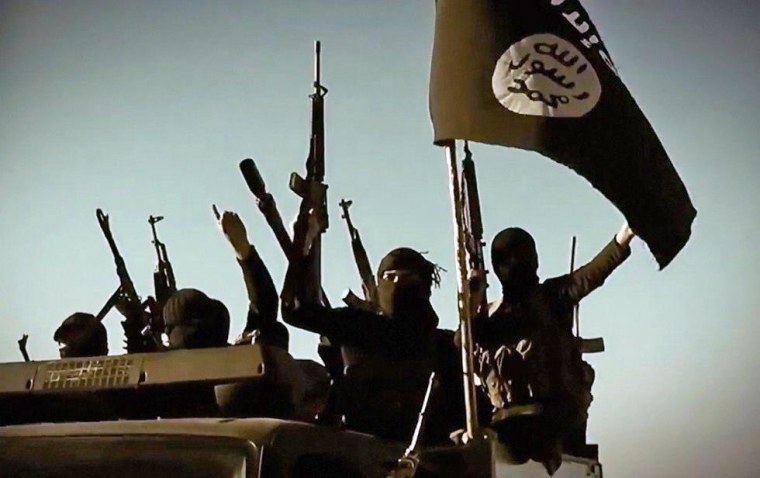Iraqi Prime Minister Nouri al-Maliki's Cabinet accused Saudi Arabia of promoting “genocide” on Tuesday by backing Sunni militias tearing through their country.
The allegations– a barrage of sectarian rhetoric against the backdrop of bloody violence gripping Iraq – were dismissed as a thinly veiled attempt to channel neighboring Iran, which is predominantly Shiite.
Sign up for breaking news alerts from NBC News
Saudi Arabia has provided funding and weapons to moderate Sunni rebels in Syria – but denies bolstering the Islamic State of Iraq and al-Sham (ISIS) – the group waging a renewed offensive in Iraq.
Sunni militants waving automatic weapons and the black flags of ISIS have captured two key Iraqi cities and pledged to bring their battle to the streets of Baghdad.
On Tuesday, Maliki's Cabinet -- which is Shiite dominated -- pointed the finger squarely at Saudi Arabia for stoking the violence.
"We hold them responsible for supporting these groups financially and morally, and for the outcome of that - which includes crimes that may qualify as genocide: the spilling of Iraqi blood, the destruction of Iraqi state institutions and historic and religious sites," the statement said, according to Reuters.
"Maliki – to put it bluntly – is a tool of Iran"
Experts and analysts said there is no evidence that Saudi Arabia has funded ISIS.
"To blame Saudi Arabia for ISIS is just inaccurate," according to David Schenker, director of the program on Arab politics at the Washington Institute for Near East Policy.
ISIS has gained strength from the war in Syria, taking advantage of a long and porous border to move arms and fighters between Iraq and its neighbor to fight for the establishment of a large Islamic caliphate straddling the countries.
Saudi Arabia and Iran are considered the key axis for Sunnis and Shiites in the region. The Saudis have been backing the moderate Sunni rebellion against Syrian President Bashar Assad’s regime, while Iran has helped prop up Assad's regime.
"We’re seeing a regional proxy war of Iran fighting Saudi Arabia, with Saudi Arabia backing regional Sunnis and Iran backing its Shiite allies,” Schenker said.
The sudden advance by Sunni insurgents has the potential to scramble alliances in the Middle East, with the United States and Iran both saying they could cooperate against a common enemy, all but unprecedented since the 1979 Iranian revolution.
ISIS has also capitalized on the anger and resentment many Sunnis feel toward Maliki’s government, beefing up its recruiting with the ranks of the disenfranchised. When Saddam Hussein's Sunni regime collapsed during the U.S. invasion in 2003, it ended Sunni political dominance that had ruled Iraq since the end of World War I.
According to the CIA World Factbook, Iraq is more than 60 percent Shiite and about one-third Sunni.
Maliki has come under withering attacks for instituting sectarian policies that have alienated and angered the Sunni population.
"We have ISIS to a large degree because Maliki has been so viciously sectarian," Schenker said. "The Sunni backlash is gaining ground not because people want ISIS, but because it is absorbing all the Sunni resentment toward Maliki."
In addition to implementing sectarian policies, Maliki also has indirectly supported Iran in its efforts to bolster Assad’s regime in Syria by giving Iran the use of its airspace, according to Schenker.
Tuesday's statement is just another sign of the Iraqi premier's closeness to the Iran's Shiite regime, Schenker said.
"The blaming of Saudi Arabia is purely an Iranian response," Schenker said. "Maliki – to put it bluntly – is a tool of Iran. This statement is a reflection of the sectarian nature of this war and what’s going on, and Maliki’s closeness and reliance upon Tehran for support."
According to Schenker, Riyadh’s approach in Syria has been to channel funding and weapons to the more moderate opposition militias battling Assad – not the more extremist groups, such as ISIS.
"The Saudis don’t like the style of ISIS," Schenker said. "This is not them."
Analysts say that by cozying up to Iran further, Maliki could further destabilize the situation.
"The closer Maliki gets to Iran and the more help he gets from Iran to help put down this rebellion, the more sectarian this becomes," Schenker said.
His Cabinet's statement also could have broader implications, according to Shashank Joshi, a research fellow at the London-based Royal United Services Institute think tank.
"Maliki is of course seeking to displace blame for the crisis onto outsiders and away from himself," Joshi said.
By placing blame on Saudi Arabia, Maliki will harden Riyadh’s stance against him and any potential Iranian role in Iraq or U.S.-Iranian cooperation there, Joshi added.
Experts concede that while the Saudi government has not directly backed ISIS, there is a chance some of its aid to more moderate militias in Syria could have made its way into the group’s hands.
There’s also the possibility, analysts say, that private citizens in Saudi Arabia and elsewhere in the Persian Gulf contributed funds to ISIS.
“Certainly, Gulf governments might have done far more to clamp down on the transfer of funds to extremist groups in general,” Joshi said. “However, to blame Saudi Arabia for creating ISIS is misguided.”
Reuters contributed to this report.
